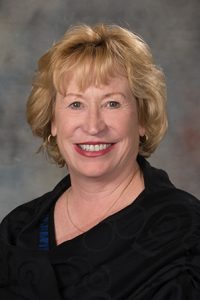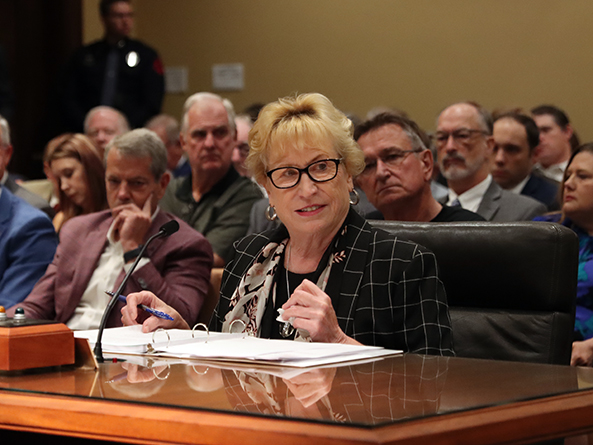Pillen plan would impose sales taxes to fund property tax relief
The Revenue Committee heard testimony July 30 on Gov. Jim Pillen’s proposal to increase state sales tax revenue to fund a new tax credit program offsetting property taxes levied by school districts.

Under LB1, introduced by Elkhorn Sen. Lou Ann Linehan on behalf of the governor, the total amount of relief provided by the program would be approximately $2 billion in tax year 2025, $2.4 billion in tax year 2026 and $2.7 billion beginning in tax year 2027. The new credit would be calculated by dividing a parcel’s valuation by the county’s total real property valuation.
To ensure that the new program reduces property taxes, Linehan said, LB1 also would cap county, city and village property tax revenue growth at 0% or the percentage change in the Consumer Price Index for All Urban Consumers, whichever is greater.
Although the Legislature has created programs providing approximately $1 billion in property tax relief annually in recent years, Linehan said, local property tax collections have increased by $1.3 billion over the same period.
“We have to have some kind of spending controls,” she said, “or we can’t solve the problem.”
Several exceptions to the cap would apply. A growing political subdivision’s preliminary property tax request authority could be increased by an amount calculated using a percentage based on the increase in total property valuation from new construction and improvements.
A political subdivision also could increase its property tax request authority by the amount of property taxes needed to respond to an emergency, the amount approved by voters in an election and the amount needed to implement a 6% increase in compensation for understaffed law enforcement officer, firefighter or corrections officer positions.
To pay for the new tax credit program, LB1 would end several sales and use tax exemptions and impose Nebraska’s 5.5% sales and use tax rate on dozens of currently untaxed goods and services, including soft drinks and candy, legal and accounting services, pet-related services and motor vehicle repair and maintenance services.
A 4% rate would apply to real property maintenance and repair services performed by carpentry contractors or electricians.
The governor’s proposal would eliminate the partial personal property tax exemption for agricultural and manufacturing machinery and equipment and impose a 2% sales tax rate on agricultural machinery and equipment purchased for use in commercial agriculture. The same rate would apply to manufacturing machinery and equipment in addition to related installation, repair and maintenance services.
LB1 also would:
• increase the tax on cigarettes from 64 cents to $1.64 per package;
• impose a 30% sales tax on electronic nicotine delivery systems and consumable hemp products;
• eliminate the sales tax exemption for mechanical amusement devices and increase the tax on cash devices from 5% to 20% and the tax on keno from 2% to 5%; and
• impose a 7.5% tax on the assessable base of companies doing business in Nebraska if their gross advertising revenue exceeds $1 billion.
Additionally, the bill would repurpose the funds allocated to the refundable income tax credit against school taxes paid that was created under the Nebraska Property Tax Incentive Act in 2020 for the new program. The change would generate approximately $565 million in fiscal year 2024-25. Pillen’s proposal also would use a portion of the funds set aside for the Property Tax Credit Act beginning with FY2025-26.
Most of the revenue generated by the bill’s provisions would be transferred to the Education Future Fund and then disbursed to counties, which then would distribute the funds to school districts.
The state Department of Revenue estimates that LB1 would increase state sales tax revenue by $417 million in FY2024-25, $648 million in FY2025-26 and $671 million in FY2026-27.
The Legislative Fiscal Analyst estimates that the bill would direct a total of $612 million to the Education Future Fund in FY2024-25, $890 million in FY2025-26 and $914 million in FY2026-27.
Pillen testified in support. When fully implemented, he said, LB1 would cut Nebraskans’ property tax bills by half on average and decrease total state and local tax collections by approximately $1 billion. The reduction would make housing more affordable for seniors and young Nebraskans, encourage business growth and help attract new residents, Pillen said.
As part of the plan, he added, the state also would assume funding for public K-12 schools’ operational expenses.
LB1 states legislative intent to replace school general fund levies by school FY2026-27 and change Nebraska’s school funding formula “in a way that will dramatically increase the level of funding provided by the state, thus providing a significant decrease in property taxes.”
Steve Gangwish, CEO of a potato farming company headquartered in Kearney, also testified in support. He said Nebraska has higher property taxes than the eight other states in which his company operates, affecting decisions about where to expand.
“Reallocating the state’s tax revenue by reducing property tax and elevating sales tax and other adjustments makes good business sense to me,” Gangwish said.
Also in support was Andy Marsh, co-owner of a company that manages properties in Grand Island and Hastings. He said property taxes are “the single reason we are forced to raise rents” and that large, unpredictable valuation increases make it difficult to budget for taxes owed on the company’s properties.
Luke Moser of Valentine also testified in support, saying property taxes are one of the largest expenses for his family’s convenience store business.
“Each year, a significant portion of our revenue is allocated to paying these taxes,” he said, “which limits our ability to reinvest in our business, hire additional staff and contribute to the local economies in which we operate.”
Several other business owners and representatives testified in opposition to LB1, saying it would make Nebraska companies less competitive.
Mark McHargue, speaking on behalf of the Nebraska Farm Bureau and several other agricultural organizations, said taxing business inputs such as agricultural equipment would increase prices for consumers and put Nebraska farmers at a disadvantage to those in neighboring states.
“This approach will surely increase costs and tighten margins for many farmers,” McHargue said, “particularly young farmers who rent agricultural land and may or may not benefit directly from the [property] tax relief.”
Bryan Slone testified in opposition to the bill on behalf of the Nebraska Chamber of Commerce and Industry and other groups representing businesses and economic developers. He said the proposal would tax certain inputs used by key Nebraska industries and disproportionately affect young people who do not own property, a key demographic the state needs to attract.
“We’re not going to be able to tax our way out of this property tax problem through a tax shift,” Slone said. “In order to provide real tax relief to Nebraskans, we need to … continue to grow the economy.”
Also in opposition was Todd Roe, co-owner of a distillery in Moorefield. He said LB1 would “crush” his business by increasing the excise tax paid by manufacturers and wholesalers of alcohol and spirits from $3.75 to $14.50 per gallon.
“This will drown us,” Roe said.
Representatives of city and county governments also testified against the governor’s plan, saying the proposed revenue growth cap would make it more difficult to fund essential public services.
Jon Cannon of the Nebraska Association of County Officials said capping county revenue growth at the percentage change in the consumer price index — which he said is not representative of what counties purchase — could lead to cuts in services.
Morrill County Sheriff Milo Cardenas testified in opposition to the bill on behalf of the Nebraska Sheriffs Association. He said the proposed revenue cap exception for law enforcement personnel is “too inflexible” and does not account for equipment and vehicle upgrades.
Also speaking in opposition was Ed Swotek, testifying on behalf of the Nebraska Association of School Boards. He said the governor’s plan to reduce property taxes by phasing out school district general fund levies would erode local control of public schools.
“There must be a nexus between the local taxpayer and the place where those taxes are being spent,” Swotek said. “LB1 removes that nexus and thereby the accountability that Nebraskans deserve.”
The committee took no immediate action on the bill.


